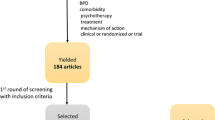Abstract
There is some evidence that the efficacy of four types of psychotherapeutic psychotherapy (mentalized-based treatment, transference-focused psychotherapy, psychoanalytic psychotherapy, and cognitive-analytic therapy), is superior to treatment-as-usual. More controlled and randomized studies are needed in order a) to confirm the results of the relatively few investigations that were available, b) to examine the therapeutic relevance and usefulness of correlates and predictors of improvement and remission in borderline patients, and c) to examine possible fruitful combinations with other types of treatment.
Similar content being viewed by others
References
American Psychiatric Association (2000). Diagnostic and statistical manual of mental disorders (4th edn.). Text Revision (DSM-IV TR). Washington, DC: APA.
Bateman, A. W. (2001). Psychoanalytic treatment of borderline personality disorder. Psychiatric Times, July, Vol. XVIII Issue 7.
Bateman, W. A. (2004). Psychodynamic psychotherapy for personality disorders. Psychiatric Times, July, Vol. XXI Issue 8.
Bateman, A. W. (1997). Borderline personality disorder and psychotherapeutic psychiatry: An integrative approach. British Journal of Psychotherapy, 13, 489–498.
Bateman, A. W., & Fonagy, P. (1999). The effectiveness of partial hospitalization in the treatment of borderline personality disorder: A randomised trial. American Journal of Psychiatry, 156(10), 1563–1569.
Bateman, A. W., & Fonagy, P. (2000). Effectiveness of psychotherapeutic treatment of personality disorder. British Journal of Psychiatry, 177, 138–143.
Bateman, A. W., & Fonagy, P. (2001). Treatment of borderline personality disorder with psychoanalytically oriented partial hospitalization: An 18-month follow-up. American Journal Psychiatry, 158(1), 36–42.
Bateman, A. W., & Fonagy, P. (2003). Health service utilization costs borderline personality disorder patients treated with psychoanalytically oriented partial hospitalization versus general psychiatric care. American Journal of Psychiatry, 160(1), 169–171.
Bateman, A. W., & Fonagy, P. (2004). Psychotherapy for borderline personality disorder—mentalization-based treatment. Oxford, UK: Oxford University Press.
Bateman, A. W., & Fonagy, P. (2004). Psychotherapy for severe personality disorders. Mentalized based treatment. Oxford: Oxford University Press.
Clarkin, J. F. (2002). The New York borderline psychotherapy project: further developments. Presented at the 5th ISSPD European Congress on Personality Disorders. Munich, Germany; July 4–7.
Clarkin, J. F., Foelsch, P. A., Levy, K. N., Hull, J. W., Delaney, J. C., & Kernberg, O. F. (2001). The development of a psychodynamic treatment for patients with borderline personality disorder: A preliminary study of behavioral change. Journal of Personality Disorders, 15(6), 487–495.
Clarkin, J. F., & Levy, K. N. (2003). A psychodynamic treatment for severe personality disorders: Issues in treatment development. Psychoanalytic Inquiry, 23(2), 248–267.
Clarkin, J. F., Yeomans, F. E., & Kernberg, O. F. (1998). Psychotherapy for borderline personality. New York: Wiley.
Filippi, L. S. (1983). “Combined,” group and individual, psychoanalytical psychotherapy with borderline individuals: Results of 15 years of treatments/Psicoterapia psicoanalitica “Combinata,” di gruppo e individuale, con soggetti borderline. Archivio di Psicologia, Neurologia e Psichiatria, 44(3), 289–298.
Kernberg, O. (1984). Severe personality disorders. New Haven: Yale University Press.
Kernberg, O. (1996). A psychoanalytic theory of personality disorders. In J. F. Clarkin & M. F. Lenzenweger (Eds.), Major theories of personality disorder (pp. 106–140). New York: The Guilford Press.
Levy, K. N., Clarkin, J. F., Foelsh, P. A., & Kernberg, O. F. (2005). Transference Focused Psychotherapy for Patients Diagnosed with Borderline Personality Disorder: A comparison with a treatment-as-usual cohort 2005 (In Review).
Lieb, K., Zanarini, M. C., Schmahl, C., Linehan, M. M., & Bohus, M. (2004). Borderline personality disorder. Lancet 2004, 364 (9432), [np].
Livesley, W. J. (2004). Changing ideas about treatment of borderline personality disorder. Journal of Contemporary Psychotherapy, 34(3), 185–192.
Martens, W. H. J. (2002). Criminality and moral dysfunctions: Neurologic, biochemical and genetic dimensions. International Journal of Offender Therapy and Comparative Criminology, 46(2), 170–182.
Martens, W. H. J. (2003a). A case study of an extremely violent serial rapist with borderline personality disorder in remission. Acta Psychiatrica Scandinavica, 107(6), 465–467.
Martens, W. H. J. (2003b). Spiritual psychotherapy for antisocial and psychopathic personalities. Journal of Contemporary Psychotherapy, 33(3), 205–218.
Martens, W. H. J. (2005a). Efficacy of dialectical behavior therapy for patients with borderline personality disorder. Annals of the American Psychotherapy Association, 8(4), 5–13.
Martens, W. H. J. (2005b). Therapeutic significant predictors and correlates of outcome and remission in borderline personality disorder. American Journal of Psychotherapy (Under Review).
Martens, W. H. J. (2005c). Multidimensional model of trauma and correlated antisocial personality disorder. Journal of Loss and Trauma, 10(2), 115–131.
Meares, R., Stevenson, J., & Comerford, A. (1999). Psychotherapy with borderline patients: I. A comparison between treated and untreated cohorts. Australian and New Zealand Journal of Psychiatry, 33(4), 467–472.
Paris, J. (1990). Empirical investigation of the role of development in the etiology and outcome of borderline personality disorder. Progress in psychiatry series. In P. S. Links (Ed.), Family environment and borderline personality disorder (pp. 123–130). Washington, DC, US: American Psychiatric Association.
Ryle, A., & Golynkina, K. (2000). Effectiveness of time-limited cognitive analytic therapy of borderline personality disorder: Factors associated with outcome. British Journal of Medical Psychology, 73(Pt2), 197–210.
Stevenson, J., & Meares, R. (1992). An outcome study of psychotherapy for patients with borderline personality disorder. American Journal of Psychiatry, 149(3), 358–362.
Wallerstein, R. S. (1986). Forty-two lives in treatment. A study of psychoanalysis and psychotherapy. New York: Guilford.
Wildgoose, A., Clarke, S., & Waller, G. (2001). Treating personality fragmentation and dissociation in borderline personality disorder: A pilot study of the impact of cognitive analytic therapy. British Journal of Medical Psychology, 74(Pt1), 47–55.
Author information
Authors and Affiliations
Corresponding author
Rights and permissions
About this article
Cite this article
Martens, W.H.J. Effectiveness of Psychodynamic Treatment in Patients with Borderline Personality Disorder. J Contemp Psychother 36, 167–173 (2006). https://doi.org/10.1007/s10879-006-9021-1
Published:
Issue Date:
DOI: https://doi.org/10.1007/s10879-006-9021-1



